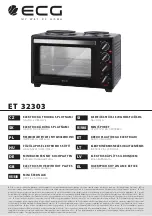
7
R6 and R6-LS TECHNICAL DATA
Hi-Flame Fireplace (UK) Limited declare that
the test stove submitted for type testing of
the R6 model represented the full production
model specifications in all critical technical
parameters needed to fulfil the requirements
of the testing standard EN 13240:2001 an
EN 13240-A2:2004. No modifications were
required to the items tested in order to meet
the requirements of the standard. All applicable
criteria on the type test have been passed in
respect of the materials, design and construction
as well as the instructions and marking.
Data
shown here is derived from SGS Nederland BV
(Notified Body) tests during June 2018 (report
number EZKA/2018-05/00015-3).
General Specification
Model Name
Hi-Flame
Model Numbers R6 and R6-LS
Dimensions (mm) R6 H532 W582 D382
R6-LS H720 W582 D382
Net Weight R6 80.0kg RS-LS 95.0kg
Data from CE and Ecodesign Tests
Nominal Heat Output
5.8kW
Efficiency (net)
77.1%
Mean CO Emission (at 13%) Vol% 0.10
NOx (at 13%) mg/m 132
OGC (at 13%) mg/m 114
PM / Dust (at 13%) mg/m 21
Mean Flue Gas Temperature 231ºC
Flue Gas Mass Flow 5.9 g/s
Minimum Distance to Combustibles
Rear
300 mm
Sides
500 mm
Non-combustible Hearths
When operated in accordance with these
instructions at a nominal output of 6.3kW
this stove is suitable for use with a 12mm
non-combustible decorative hearth – subject
to Building Regulations.
Tested hearth temperature 46ºC
Flue
This stove must not be installed in a shared flue
Flue configuration top or rear
Flue pipe diameter 150 mm
Minimum diameter required for chimney
system and connecting flue pipe 150 mm
Height to centre rear flue outlet R6 436 mm
R6-LS 624mm
From centre of top flue outlet to back 127mm
This excludes any gap required between the
DEAS inlet and the back wall of the fireplace.
Minimum flue height required
from the top of the stove 4500 mm
Minimum flue pressure
12Pa
Recommended flue pressure range 12 – 18Pa
See page 36 regarding the appropriate flue
pressure and spillage tests required during
commissioning for installations with DEAS.
Air Supply
In pre-2008 dwellings a dedicated air vent’ is
not usually required for this stove (subject to
Building Regulations). In dwellings built after
2008 then a dedicated air supply is required
to ensure the safe operation of the stove. This
air can either be supplied via a vent to the
room or via a direct external air supply (DEAS)
using the stove’s air inlet and appropriate non-
combustible ducting. See pages 35 – 37.
DEAS inlet external diameter 90 mm
Fuel
Seasoned wood logs with a moisture content
of less than 20%
Recommended maximum log length 350 mm
Recommended fuel load 1.25kg
For more information about wood burning
and buying seasoned wood please visit the
Ready to Burn scheme (supported by Defra)
www.readytoburn.org.
Modifications
This stove must not be modified in any way –
modifications could affect its safe performance.
03
03
03
*
*








































